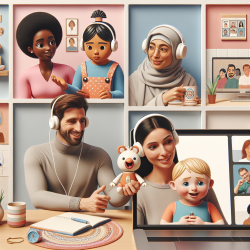In the realm of speech-language pathology, data-driven decisions and evidence-based practices are paramount for creating positive outcomes for children. A recent study published in the International Journal of Environmental Research and Public Health titled Method for the Development of Accessible Mobile Serious Games for Children with Autism Spectrum Disorder provides insightful findings that can significantly enhance therapeutic practices for children with Autism Spectrum Disorder (ASD).
Key Findings and Implications for Practice
The study emphasizes the importance of incorporating both usability and accessibility into the development of mobile serious games designed for children with ASD. These elements are critical for ensuring that such applications are effective and user-friendly. The research proposes a method that integrates User-Centered Design (UCD) and serious game development to create accessible and engaging tools for children with ASD.
User-Centered Design (UCD)
The UCD method focuses on involving end-users—children with ASD, their parents, and therapists—throughout the design process. This approach ensures that the final product meets the specific needs and preferences of its users. The UCD process includes the following phases:
- Identify Intended User: Collecting functional and non-functional requirements, including accessibility needs.
- Initial Design: Creating a preliminary design based on stakeholder feedback.
- Prototype Creation: Developing a prototype for iterative testing and feedback.
- User Testing: Conducting usability tests to validate the prototype's functionalities.
- Final Product: Refining the product based on test results to create a user-ready application.
Mobile Serious Game Development
The proposed method for developing mobile serious games includes several critical elements:
- Game Title: The name, target age, and key features of the game.
- Game Flow: A detailed diagram of the game's functioning and user interactions.
- Experience: The intended user experience, including the educational and behavioral goals.
- Mechanics: The gameplay elements, including challenges and rewards.
- Accessibility: Incorporating guidelines to ensure the game is accessible to children with ASD.
Quality Evaluation
The Mobile App Rating Scale (MARS) was used to assess the quality of the developed application. The evaluation covered four dimensions: engagement, functionality, aesthetics, and information. The findings highlighted that while the application scored highly in functionality and aesthetics, there is room for improvement in engagement.
Practical Applications for Speech-Language Pathologists
Speech-language pathologists can leverage the findings from this study to enhance their therapeutic practices in several ways:
- Integrate Technology: Utilize accessible mobile serious games as supplementary tools in therapy sessions to improve communication skills in children with ASD.
- Personalize Therapy: Tailor the use of these applications to meet the individual needs of each child, ensuring that the games are both engaging and educational.
- Collaborate with Developers: Provide feedback to app developers to continually improve the usability and accessibility of therapeutic applications.
By incorporating these evidence-based strategies, practitioners can create more effective and engaging therapeutic experiences for children with ASD.
To read the original research paper, please follow this link: Method for the Development of Accessible Mobile Serious Games for Children with Autism Spectrum Disorder.










